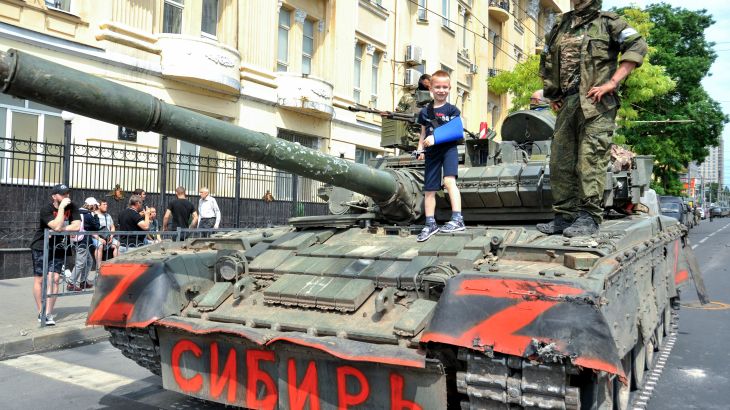‘Not overthrowing power’: Wagner boss Prigozhin defends uprising
Russian mercenary boss issues first statement since aborted mutiny, insists his forces reacted to being attacked by the military.

Wagner Group head Yevgeny Prigozhin defended his “march on Moscow” with a convoy of tanks, saying the move was not an attempted coup and was conducted as a protest against Russia’s military leadership.
He called the move a reaction to an attack on his forces that he said killed about 30 fighters. He spoke on Monday in his first audio statement since the aborted armed rebellion he staged on Saturday.
Keep reading
list of 4 itemsRussian defence chief makes public appearance after Wagner revolt
Disbelief, anger: Russians struggle to process Wagner revolt
Qatar emir talks to Putin after Wagner mutiny in Russia
“We started our march because of an injustice. We went to demonstrate our protest and not to overthrow power in the country,” Prigozhin said in the 11-minute audio message.
He did not offer any details as to where he was or what his future plans are.
Prigozhin said his fighters had the support of “happy” civilians in towns they went through as they advanced on Moscow.
“In Russian towns, civilians met us with Russian flags and the symbols of Wagner,” he said. “They were all happy when we passed through.”
The convoy stopped 200km (125 miles) short of Moscow and had “blocked all military infrastructure” including air bases along its path, he added.
Russian media reported that a criminal probe against Prigozhin continued, and some lawmakers called for his head.
Prigozhin said the way Wagner was able to seize the southern Russian city of Rostov-on-Don and a major military base without bloodshed had been testament to the effectiveness of his fighters.
“We showed a master class as it should have been on February 24, 2022. We did not have the goal of overthrowing the existing regime and the legally elected government,” he said.
Victor Olevich, a political analyst with the Center for Actual Politics, told Al Jazeera it is not surprising that Prigozhin defended his actions.
“It’s quite logical that Prigozhin would blame Russia’s military leadership, which he has been in conflict with for months. When a key southern city in Russia … has been taken over by a private military company, … of course whatever justifications are stated by Prigozhin, this created an internally dangerous situation.”
Most serious political crisis
Earlier, Defence Minister Sergey Shoigu made his first public appearance since the uprising that was meant to oust him. He appeared in a video aimed at projecting a sense of order after Russia’s most serious political crisis in decades.
A feud between the Wagner Group’s leader and Russia’s military brass has festered throughout the war, and it erupted into a mutiny that saw the mercenaries leave Ukraine to seize a southern military headquarters and roll seemingly unopposed towards Moscow – before turning around after less than 24 hours.
The Kremlin said it made a deal for Prigozhin to move to Belarus and receive amnesty along with his fighters.
There was no confirmation of his whereabouts on Monday although a popular Russian news channel on Telegram reported he was seen at a hotel in the Belarusian capital, Minsk.
Belarusian President Alexander Lukashenko has proposed ways in which the Wagner Group could continue to operate, Prigozhin said.
“Lukashenko held out his hand and offered to find solutions for the continuation of the work of the Wagner private military company in a legal jurisdiction,” he said in the audio message.
Pushing Russia too far?
Prigozhin renewed an allegation – so far unsupported by evidence – that the Russian military attacked a Wagner camp with missiles and then helicopters and said this was the immediate trigger for what he called the “march of justice”.
Wagner stopped its advance towards Moscow at the moment when it realised it would have to confront waiting Russian troops and blood would inevitably be shed, he said, reiterating an assertion he made on Saturday.
Prigozhin, a former close ally of President Vladimir Putin, said he regretted his fighters had to kill Russian soldiers who attacked their convoy from helicopters.
He also again complained about a military order that all volunteer units – including Wagner – must sign contracts by July 1 and place themselves under the control of the defence ministry.
Fewer than 2 percent of Wagner’s men have signed up, Prigozhin added. “The aim of the march was to avoid the destruction of Wagner.”
Olevich blamed the West for the rebellion, saying the situation would not have happened if not for the Western pressure on Russia. He said if the West destabilizes Putin’s government to the point where he is replaced, it would face a more dangerous government.
“Is pushing Russia too far, is isolating Russia too much, is sanctioning Russia too heavily – can those measures bring Russia to such an unstable situation that the West will face a threat of an entirely different magnitude?” he asked.
US President Joe Biden on Monday said the brief uprising was an internal struggle within Russia and the United States and its allies had nothing to do with it.
“We made clear we were not involved, we had nothing to do with this,” Biden said in his first comments on the mutiny.
